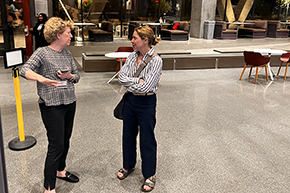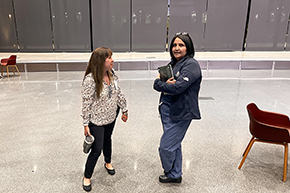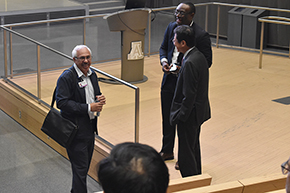![Click to enlarge: Collage of three images from the University of Arizona Department of Medicine DEI Mixer held Nov. 4, 2024, at the UAHS Health Sciences Innovationg Building [Collage of three images from the University of Arizona Department of Medicine DEI Mixer held Nov. 4, 2024, at the UAHS Health Sciences Innovationg Building]](https://deptmedicine.arizona.edu/sites/default/files/00-dom_dei_mixer_11.04.24_475x356px_0.jpg) Roughly thirty people attended the 2024 Department of Medicine mixer hosted Monday, Nov. 4, by the Diversity, Equity and Inclusion Committee in the Health Science Innovation Building’s Forum and ASTEC simulation lab, including at least 10 pre-med and medical students interested in internal medicine.
Roughly thirty people attended the 2024 Department of Medicine mixer hosted Monday, Nov. 4, by the Diversity, Equity and Inclusion Committee in the Health Science Innovation Building’s Forum and ASTEC simulation lab, including at least 10 pre-med and medical students interested in internal medicine.
Below, you’ll find a mini-photo gallery from the event.
In addition to the sim lab experience, the mixer included a captivating talk by Francisco Moreno, MD, titled, “Justice, Equity, Diversity and Inclusion in Medical Education Research and Practice.” Dr. Moreno is a University of Arizona College of Medicine – Tucson psychiatry professor and associate vice president over the Office of Equity, Diversity & Inclusion and director of the Hispanic Center of Excellence at the U of A Health Sciences.
![Christian Bime, MD, MSc [Christian Bime, MD, MSc]](https://deptmedicine.arizona.edu/sites/default/files/bime_christian-md-msc_201300763_dsc6952_100x150px.jpg) “Dr. Moreno gave a very cogent reflection of the positive impact on our patients a diverse healthcare workforce has,” said DOM Vice Chair for DEI Christian Bime, MD, MSc, who’s also an associate professor in the Division of Pulmonary, Allergy, Critical Care & Sleep Medicine, or PACCS. “Building an inclusive environment is what we strive for always. And it was wonderful to see the positive engagement from a diverse group of medical students, staff and faculty at the procedure simulation session.”
“Dr. Moreno gave a very cogent reflection of the positive impact on our patients a diverse healthcare workforce has,” said DOM Vice Chair for DEI Christian Bime, MD, MSc, who’s also an associate professor in the Division of Pulmonary, Allergy, Critical Care & Sleep Medicine, or PACCS. “Building an inclusive environment is what we strive for always. And it was wonderful to see the positive engagement from a diverse group of medical students, staff and faculty at the procedure simulation session.”
The students were thrilled to get a chance to work with DOM faculty in the Arizona Simulation Technology and Education Center, or ASTEC, on HSIB’s seventh floor. They got hands-on opportunities to learn about different procedures at four stations. The stations included: ![Clockwise from top left: Ryan Wong, MD, Monica Hinestroza Jordan, MD, Andre Johnson, MD, PhD, and Madhav Chopra, MD [Clockwise from top left: Ryan Wong, MD, Monica Hinestroza Jordan, MD, Andre Johnson, MD, PhD, and Madhav Chopra, MD]](https://deptmedicine.arizona.edu/sites/default/files/drs._wong_hinestroza_johnson_chopra_205x305px.png)
- Central line placement (a catheter inserted into a large vein to connect to the heart) with Ryan Wong, MD, a Division of Nephrology assistant professor and director of the DOM IM sub-internship program;
- Lumbar puncture, also known as a spinal tap (a procedure to insert a needle into the spinal canal to extract cerebrospinal fluid), with Monica Hinestroza Jordan, MD, Division of Infectious Diseases assistant professor;
- Thoracentesis (a procedure to insert a needle or catheter into the pleural space around the lungs to remove fluid or air) with Madhav Chopra, MD, assistant professor and member of Interventional Pulmonology Program team, PACCS Division; and
- Joint aspiration, also known as arthrocentesis (a procedure using a needle and syringe to remove fluid from a joint, in this case the knee), with Andre Johnson, MD, PhD,* a fellow in the Pulmonary & Critical Care Medicine Fellowship of the PACCS division.
* This station was originally to be led by Riyasha Daulat, MD, a fellow in the Division of Rheumatology, but she was unable to attend.
Dr. Hinestroza said she really enjoyed working with students in the sim lab experience. “The earlier we expose them to the clinical environment and clinicians, the more they’ll be able to really determine what kind of medicine they want to practice. I believe that sometimes, the lack of exposure of some disciplines is part of the reason why so many subspecialties are having such a hard time recruiting the physicians of tomorrow,” she added.
Dr. Moreno also was glad to be a part of the evening’s activities.
“It was great to see the Department of Medicine’s outreach efforts to connect with its members, trainees and students. Our discussion on Justice, Equity, Diversity and Inclusion in medical education, research and practice was a great opportunity to remind ourselves of the values that make a great program in the service of our community,” he said.
His talk included stark statistics on the makeup of the health care workforce and inverse disparities in Arizona’s patient population and those underrepresented in healthcare professions (particularly physicians) and biomedical research.
![Francisco Moreno, MD, and Celia Valenzuela, MD [Francisco Moreno, MD, and Celia Valenzuela, MD]](https://deptmedicine.arizona.edu/sites/default/files/drs.-moreno-n-valenzuela_205x150px_1.png) Dr. Moreno also noted how most research data comes from those of European descent, adding that efforts such as the NIH Minority and Health Disparities Strategic Plan (2021-25) and All of Us Research Program are amending that. Other positive efforts at the U of A include the Arizona CEAL Consortium, Arizona Approaches to Equity, Pandemics, Lungs & Sleep Program, Southwest Center for Advancing Clinical and Translational Innovation, and the AZ-HOPE and RECOVER clinical trials programs.
Dr. Moreno also noted how most research data comes from those of European descent, adding that efforts such as the NIH Minority and Health Disparities Strategic Plan (2021-25) and All of Us Research Program are amending that. Other positive efforts at the U of A include the Arizona CEAL Consortium, Arizona Approaches to Equity, Pandemics, Lungs & Sleep Program, Southwest Center for Advancing Clinical and Translational Innovation, and the AZ-HOPE and RECOVER clinical trials programs.
As the DEI Mixer occurred a day prior to the national U.S. elections, Dr. Moreno also stressed the significance of voting as a social determinant of health and underscored the importance of voting for all.
Also present was Celia Valenzuela, MD, a College of Medicine – Tucson associate professor of obstetrics and gynecology and the college’s vice dean for diversity, equity and inclusion. She pointed out the DEI office at the college recently was renamed as the Office of Inclusivity, Community and Belonging, noting that some associated the word “diversity” with differences rather than commonalities everyone shares.
MINI-PHOTO GALLERY *
* Click on images to enlarge. Rollover image with mouse for captions.
(Photos courtesy of David Mogollon, Bersabe Lopez, Christian Bime, MD, and Kyle McLemore)
ALSO SEE:
“U of A-led NHLBI Workshop explores disparities in pulmonary hypertension” | Posted Oct. 21, 2024
“APPLS applicants sought for lung and sleep health scientist training program” | Posted March 29, 2024
“Translational Medicine Symposium refocuses research on practical remedies” | Posted March 22, 2024
“UArizona Health Sciences to Lead Statewide Outreach to Reduce Disparities in COVID-19 Research, Clinical Studies” | Posted Oct. 29, 2020


![Health Sciences Innovation Building at the University of Arizona Health Sciences campus in Tucson [Health Sciences Innovation Building at the University of Arizona Health Sciences campus in Tucson]](https://deptmedicine.arizona.edu/sites/default/files/01-dom_dei_mixer_11.04.24_hsib_azds.image_290x193px.jpg)
![Entryway to the Arizona Simulation Technology and Education Center, or ASTEC, on HSIB’s seventh floor [Entryway to the Arizona Simulation Technology and Education Center, or ASTEC, on HSIB’s seventh floor]](https://deptmedicine.arizona.edu/sites/default/files/02-dom_dei_mixer_11.06.24_astec_entry_290x193px.jpg)
![Storage for mannikins of different bodies, body parts and colors representing various ethnicities and ages in the ASTEC simulation lab [Storage for mannikins of different bodies, body parts and colors representing various ethnicities and ages in the ASTEC simulation lab]](https://deptmedicine.arizona.edu/sites/default/files/03-dom_dei_mixer_11.04.24_cdm_img_7343_290x193p.jpg)
![Dr. Ryan Wong shows students how to place a central line catheter into a vein that goes to the heart. [Dr. Ryan Wong shows students how to place a central line catheter into a vein that goes to the heart.]](https://deptmedicine.arizona.edu/sites/default/files/05-dom_dei_mixer_11.04.24_bl_img_8967_290x193px.jpg)
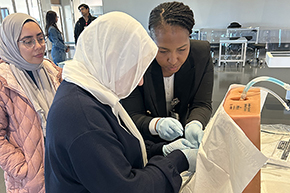
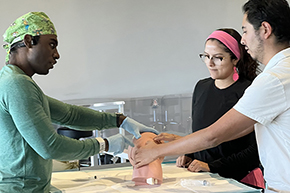
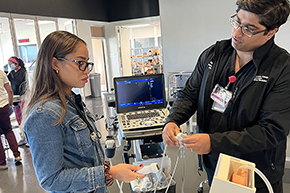
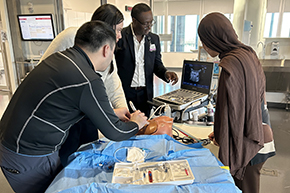
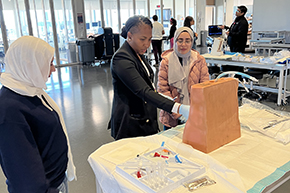
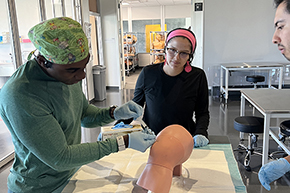
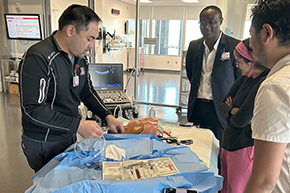
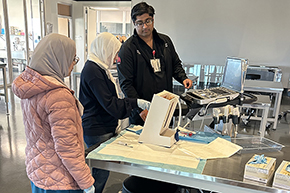
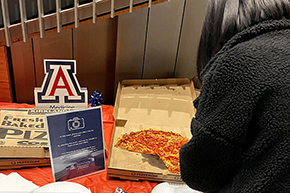
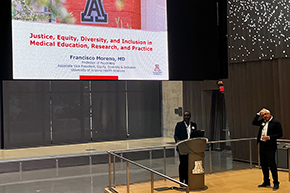
![U of A Health Sciences associate vice president for equity, diversity and inclusion, Dr. Francisco Moreno talks about disparities and inequities that exist in health care not only among patients but the ethnic and other differences in medical professionals who treat them. [U of A Health Sciences associate vice president for equity, diversity and inclusion, Dr. Francisco Moreno talks about disparities and inequities that exist in health care not only among patients but the ethnic and other differences in medical professionals who treat them.]](https://deptmedicine.arizona.edu/sites/default/files/16-dom_dei_mixer_11.04.24_dsc_6876_290x193px.jpg)
![Left from third person in: Dr. James Liao, Dr. Amy Sussman and Dr. Sangeetha Murugapandian [Left from third person in: Dr. James Liao, Dr. Amy Sussman and Dr. Sangeetha Murugapandian]](https://deptmedicine.arizona.edu/sites/default/files/15-dom_dei_mixer_cdm_11.04.24_dsc_6851_290x193px.jpg)
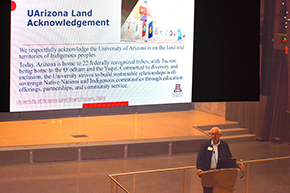
![Drs. Celia Valenzuela (left), OB-GYN and College of Medicine – Tucson assisant dean for DEI, and Jim Knepler, an interventional pulmonologist, watch Dr. Moreno speak. [Drs. Celia Valenzuela (left), OB-GYN and College of Medicine – Tucson assisant dean for DEI, and Jim Knepler, an interventional pulmonologist, watch Dr. Moreno speak.]](https://deptmedicine.arizona.edu/sites/default/files/18-dom_dei_mixer_11.04.24_dsc_6881_290x193px.jpg)
![Dr. Francisco Moreno talks about quote of Dr. Martin Luther King, Jr., on the greatest inequity being that of health care in the U.S. [Dr. Francisco Moreno talks about quote of Dr. Martin Luther King, Jr., on the greatest inequity being that of health care in the U.S.]](https://deptmedicine.arizona.edu/sites/default/files/19-dom_dei_mixer_11.04.24_dsc_6867_290x193px.jpg)
![Dr. Francisco Moreno references two slides where graphs show inverse inequities between racial breakdown of patients and the clinicians who treat them. [Dr. Francisco Moreno references two slides where graphs show inverse inequities between racial breakdown of patients and the clinicians who treat them.]](https://deptmedicine.arizona.edu/sites/default/files/20-dom_dei_mixer_11.04.24_dsc_6873_290x193px.jpg)
![Dr. Francisco Moreno discusses different measures of access to health care inequities in Arizona. [Dr. Francisco Moreno discusses different measures of access to health care inequities in Arizona.]](https://deptmedicine.arizona.edu/sites/default/files/21-dom_dei_mixer_11.04.24_dsc_6872_290x193px.jpg)
![Dr. Saad Sammani, a research professor in the Pulmonary division, listens to Dr. Francisco Moreno's address at the DOM DEI Mixer. [Dr. Saad Sammani, a research professor in the Pulmonary division, listens to Dr. Francisco Moreno's address at the DOM DEI Mixer.]](https://deptmedicine.arizona.edu/sites/default/files/22-dom_dei_mixer_11.04.24_dsc_6882_290x193px.jpg)
![Dr. Francisco Moreno talks about the NIH Minority and Health Disparities Strategic Plan (2021-25) and its efforts to address inequities in healthcare. [Dr. Francisco Moreno talks about the NIH Minority and Health Disparities Strategic Plan (2021-25) and its efforts to address inequities in healthcare.]](https://deptmedicine.arizona.edu/sites/default/files/23-dom_dei_mixer_11.04.24_dsc_6879_290x193px.jpg)
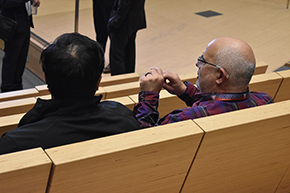
![Dr. Francisco Moreno talks about various programs under the Arizona Health Opportunities Pathways to Excellence, or AZ-HOPE, effort to get better mix of underrepresented groups in healthcare professions. [Dr. Francisco Moreno talks about various programs under the Arizona Health Opportunities Pathways to Excellence, or AZ-HOPE, effort to get better mix of underrepresented groups in healthcare professions.]](https://deptmedicine.arizona.edu/sites/default/files/24-dom_dei_mixer_11.04.24_dsc_6891_290x193px.jpg)
